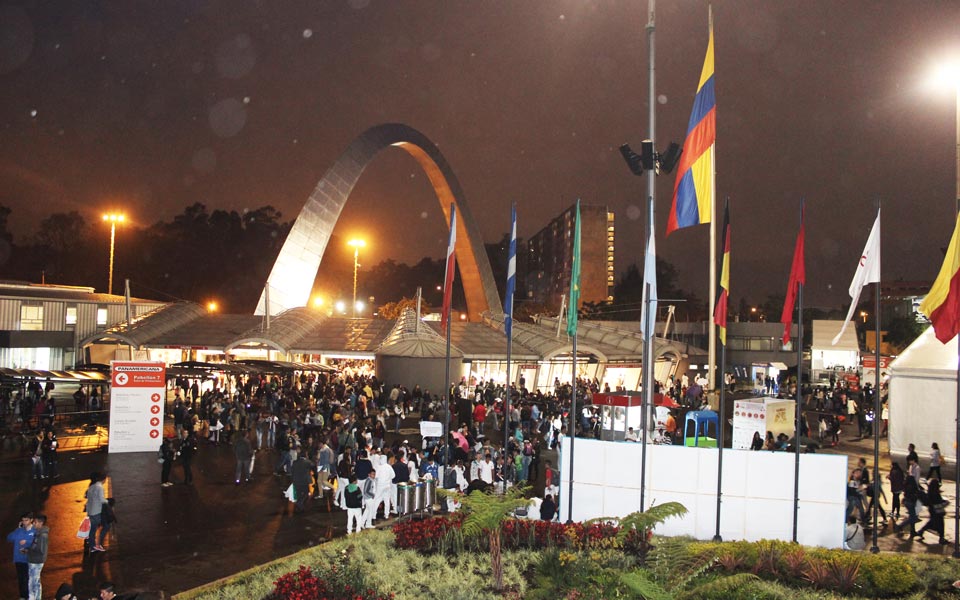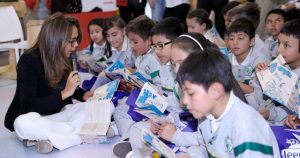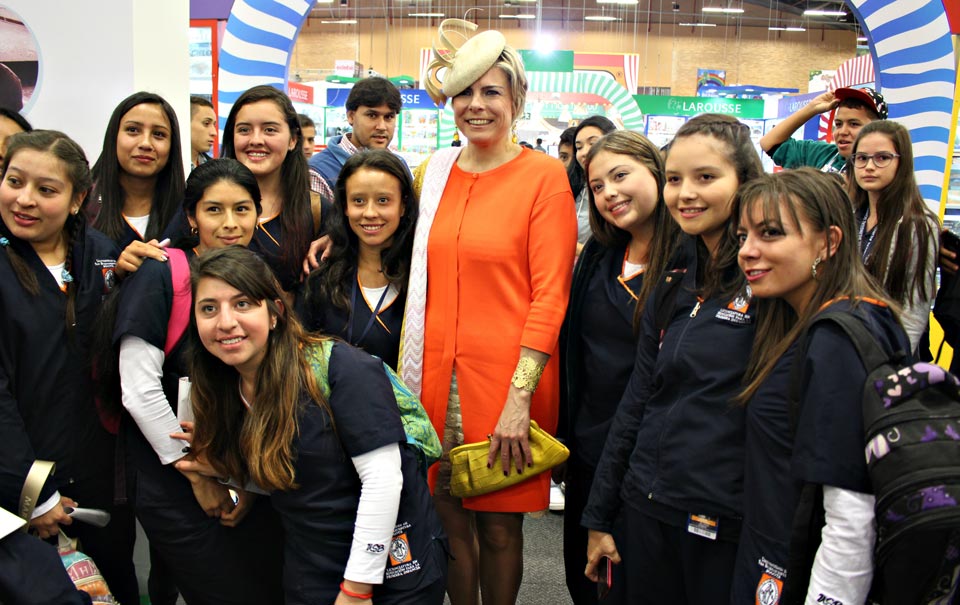 Oli Pritchard takes The Bogotá Post on a speedy trip through this year’s Dutch themed FILBo
Oli Pritchard takes The Bogotá Post on a speedy trip through this year’s Dutch themed FILBo
Leer es Volar. To read is to fly. A succinct description of the joy of the written word. It sums up so well the joy of reading, of looking not outwards to the world, but inwards to your imagination. This apt phrase is part of the Colombian government’s program to increase reading throughout the country. And at FILBo, this joy was writ large across Corferías, just off the road leading to the airport, for two glorious weeks.
If you’ve never been, Corferias, the exhibition space for Bogotá, is enormous. Sprawling across several dozen pavilions, some the size of aircraft hangars, it’s rarely completely taken over. FILBo, though, did exactly that. With thousands of visitors, this really was a celebration of reading unparalleled in Colombia.



Although short on places to read, everywhere one cast a glance there were groups of people gathered on steps, nestled in alcoves, perched upon walls, huddled around food court tables, even lying in hedges or reclining upon grassy knolls. Each and every one with a book in their hand, preferred for the moment to some ghastly googlephone. We live in a world where people read constantly, yet rarely for any length of time or through any great text, which is what makes events such as FILBo so damn important.
Filbo was filled, though, with more than simply books. At every turn there were authors signing works, famous names giving talks and speeches, even musical events. We’ve highlighted some of these in previous articles (and here and here), although there was plenty more going on. We learnt about local markets from cheerily sexist historians, took notes on the state of Colombian forests and chuckled with Argentinian illustrator Maitena.
Alternative writers were well represented this year, whether they were there to shine a spotlight on often invisible groups like Colombian muslims, or promoting their own theories such as Astral Flying. Author Néstor Montes Salamanca gave us the lowdown on ‘metaphysical journeys’ as he promoted his book on the subject: “It’s about using your whole mind, not just the parts you normally use. I want everyone to be able to open up their mind and travel through the astral realm”. Perhaps not of interest to everyone, but there are stranger myths down the road at the Christian shops.
In among the wackiness and bookshops were also plenty of government ministries, charities and foundations. Esteemed personalities such as Education Minister Gina Parody were to be found here, happy to roll up her sleeves and listen to children learning to read and giving mini-presentations.
With peace seemingly ahead of Colombia, there were a multitude of references to the future. Everyone is jumping on this bandwagon, from government ministries to universities and even the military. This last group is not to be dismissed lightly – the Colombian military has gone in hard to rework their image for peacetime. With a harsh light likely to be shone on their conduct throughout the times of conflict, this was a heavy barrage of propaganda.
Other projects could be found throughout the centre, such as the excellent library project from the Banco de la Republica. Best of all, though, was the upcoming Centro de Memoría and a team member, Diana Zerda, who kindly gave us a few words. “It’s a chance to make visible the work we have planned and to give a stage to the victims (…) It’s important to record historical memory and inform people about everything that has happened in the armed conflict over the years”.
Speaking of political pushes, the already-embattled Peñalosa got his people to work too. His proud declaration at the opening ceremony that “this is the first year local government agencies have been the primary sponsors of FILBo”, was backed up with plenty of presence. The great leader himself contributed to the interactive displays with glib statements about writing (in peculiarly poor writing).
Most spectacular was the enormous “Bogotá mejor por todos” tent front and centre, which housed a giant floor map of Bogotá over which we enthusiastically scrambled in search of our houses, like horrendous clichés. Surrounding us were dozens of plants, creating a garden-like atmosphere replete with books to be borrowed for free to relax with in deckchairs.
In a country with frighteningly low reading levels (fewer than two books a year, according to the Ministry of Culture), the attendance of hundreds of younguns can only be applauded by us all, even if it means tolerating a bit more noise than one would like.
In the end, this is the point of events like FILBo, and they’re something Bogotá does very, very well. This really is Bogotá for Bogotanos, not just the rich elite with money to burn, but neither is it sidelined and tucked away in some forgotten barrio. So next time someone starts chuntering off on how there’s never any culture here in Colombia, remind them of what FILBo brings to the city.
By Oli Pritchard
There was a time, once, when I believed, as many young and aspiring writers do, that there was a real pleasure, a real joy to be had, in the process of writing. Well, if I have to give a pretentious Latin phrase to warn all those idealists, then how about this: Caveat Scriptor. Let The Writer Beware.
As I write this very piece, I am trying to avoid getting a cold. I am still adapting my biological rhythms to eight-hour workdays at my new job. I have eaten dinner and gone for a walk. And now, I am exhausted, as my body and a good portion of my conscious mind begs me to just call it a night and get on to the next day already.
Yet for some reason, the Word that is within me–as it is within all of us–refuses to stay silent. Even now, my thoughts are organizing themselves in parallelisms and a subtle chain of reasoning attempts to break through my relentless lethargy. And the more I write, the clearer my mind becomes, the sharper my focus grows, until I am almost free from that slow descent into quiet oblivion.
Writing must always contend with the human condition. The Ideal World in our minds and hearts must struggle to be born through the viscous and vile membranes of our frail, physical selves. Indeed, one might say that a writer is very much a Warrior, and like any true Warrior, his greatest enemy is the one from within. On the outside, he is fighting to overcome the blank canvas with the power of his Word-made-flesh; on the inside, he is resisting the voice of despair and doubt, trying to let his True Voice sing out…
Writing is not a pleasant process. Fretting over the right word, going over drafts to discover grammar and spelling mistakes that would be expected from a kindergartener, living with the possibility and reality of rejection by editors, audience, and one’s own peers–these are the things a writer must endure for the sake of his craft. Because sometimes, when the air is full of magic and promise, when the madness is shrieking in our ears and the demons of our lives begin to pound away at the base of our skulls, there comes a moment of peace within the agony, and the Word of Beauty, the Word of Truth and Power and Love, steps forward and makes itself heard, and from the mundane tortures of our art, a Miracle is born.
—
This is the Scriptorium, signing off!
The pronoun They, as used throughout paragraph 3, refers to …
1) board members.
2) former students.
3) future graduates.
4) the author’s friends.
Philanthropy is defined as the love of humanity. A modern definition is “private initiatives, for the public good, focusing on quality of life”, which combines an original humanistic tradition with a social aspect developed in the 20th century.
Growing up in this state, I dreamed of attending a college one day. On fall Saturdays at the stadium, I caught a glimpse of the brick buildings and tree-lined walkways. I knew they led to information, knowledge, and a whole tribe of new minds to connect with. When the day finally came to unpack my few belongings in the residence hall, I knew I was finally where I had always wanted to be. My years on campus certainly lived up to the anticipation. The classes, professors, friends, and opportunities created a life-changing experience.
Philanthropy is a critical part of the life and success of the whole local community, and college in particular. As a board member of the Center for Advancement, I have seen firsthand the joy of our alumni and friends as they make a difference in the life of this institution. They are delighted to pay it forward as they understand what college means to them. As a student, one does not always value how much the path was paved by those who have gone before, those who have an ability to give back. Now that my friend and I have made this community our family’s home, we have a much better understanding of how vital the longterm success of the college is for our entire state.
Through my involvement with the Center for Advancement, I truly witness the breadth of areas one can support. This institution is doing incredible researching, educating, and programming in so many areas. And our donors can discover their passion and connect in a meaningful way that goes beyond the dollars given. Whether it is the joy of the written word, the connection to firstgeneration college students, the atmosphere of a football Saturday, or a desire to support the cure for a hereditary medical condition, our donors become a part of the life of the college.
I have also seen philanthropy directly affect the life of the college from my experience in the Department of Finance. I work with students who have the opportunity to attend college because of the financial assistance they receive from our donors. Continued support has fostered the enhanced facility we work in today which has been reconfigured to remain relevant to today’s needs. The educational experience is much richer because of the generosity of others. Our new auditorium is one shining example that we are proud to support. Not only is this facility a marvel of world-class architecture and programming, it also strives to make the arts accessible to all citizens. These experiences spark curiosity and imagination in audiences, young and old, to remind us what it means to be alive in this era of technology and separation.
Different funds provide a real-life working experience that is as relevant as any internship. Through philanthropy, students and faculty are able to use technology that could not be supported with tuition dollars. Private gifts also allow us to assist our faculty, who are the life of the institution, and provide our students a top-notch education.
Every dollar of support to the university today replays itself over and over as successive generations of learners have an opportunity to develop the skills they need to save lives, shape minds, and transform our future. One of the values we hope to instill in our children is the understanding of the value of giving back.
1) Прочитайте текст и запишите в поле ответа цифру 1, 2, 3 или 4, соответствующую выбранному Вами варианту ответа.
Показать текст. ⇓
The author’s childhood dream was to
1) enter a college.
2) change her life.
3) leave the state she grew up in.
4) visit a college campus.
2) Прочитайте текст и запишите в поле ответа цифру 1, 2, 3 или 4, соответствующую выбранному Вами варианту ответа.
Показать текст. ⇓
The pronoun They, as used throughout paragraph 3, refers to
1) future graduates.
2) former students.
3) board members.
4) the author’s friends.
3) Прочитайте текст и запишите в поле ответа цифру 1, 2, 3 или 4, соответствующую выбранному Вами варианту ответа.
Показать текст. ⇓
Working in the Center for Advancement allowed the author to
1) appreciate donors’ aid.
2) become more successful.
3) make lots of new friends.
4) make a big difference in students’ lives.
4) Прочитайте текст и запишите в поле ответа цифру 1, 2, 3 или 4, соответствующую выбранному Вами варианту ответа.
Показать текст. ⇓
Which of the following did the college donors NOT do?
1) Communicate with students.
2) Attend college sport clubs.
3) Write for college publications.
4) Sponsor health treatment.
5) Прочитайте текст и запишите в поле ответа цифру 1, 2, 3 или 4, соответствующую выбранному Вами варианту ответа.
Показать текст. ⇓
It is implied that the new auditorium supports an education program in
1) programming.
2) architecture.
3) arts.
4) technology.
6) Прочитайте текст и запишите в поле ответа цифру 1, 2, 3 или 4, соответствующую выбранному Вами варианту ответа.
Показать текст. ⇓
It is implied that college teachers
1) have relevant experience.
2) lack technology skills.
3) are paid regularly.
4) may be supported by private gifts.
7) Прочитайте текст и запишите в поле ответа цифру 1, 2, 3 или 4, соответствующую выбранному Вами варианту ответа.
Показать текст. ⇓
The major aim of the article is to
1) show the author’s experience of philanthropy.
2) criticize how the donors’ money is spent.
3) explain what philanthropy really is.
4) pay tribute to the people supporting college.
The written word spreads so much joy and contentment to anyone interested in reading. However we might receive it, digitally or in a hard copy, those written words convey everything. Our past, our present and our future must surely all be able to be woven into written words. I feel so blessed to have a scant ability to weave words together to bring pleasure to my readers. Being able to share my love of reading and writing gives me a huge case of the warm and fuzzies. Whether that is through the books I’ve written, the workshops I’ve conducted or some other form – like last week – I love to feel I’ve connected with others who also love the written word.
Last week I received a lovely email from a lady I’ll call MaryLou. (I don’t have permission to disclose so will not use real names). I’m uncertain where in the world she resides or who she is. From her email I know she has helped children learn about and appreciate the written word. She’s encouraged children to explore the possibility of developing their own stories, while volunteering in her local library.
MaryLou has a young helper, Bailey (not her real name). Bailey explored the Internet looking for links which might expand the children’s knowledge and understanding as they experiment with writing. During her search, she found one site particularly relevant. Some children showed interest in movie writing and MaryLou and Bailey gleaned useful information to share with them. It was thanks to Bailey and the links on my website that I was able to assist in some small way with the work her and MaryLou were doing.
I’m so grateful to MaryLou for taking the time to drop me an email. Writing is such an isolated occupation and the hear from readers is a real treat. MaryLou’s email was so different from the contacts I usually get, and I appreciate knowing I might have offered just a little something. Thank you MaryLou and Bailey, for not only contacting me, but for encouraging those children. To encourage others, especially the young, to explore their imagination and write! That’s better than gold to me.
Of all
the many and varied motivations to put one’s words in the medium of
writing, I can think of few better reasons than for the simple pleasure of
the art-form. I don’t want to confuse this with just the desire to entertain. I
mean writing in a broader sense, all writing that has purpose in communication,
even to one’s self alone. Writing that goes from the heart to the
hand to the page and returns to its creator in dividends of understanding,
learning and growth, mental stretching and creativity, and entertainment. To
project a unique perspective from the invisible realm of the mind to the physical
world is among the single greatest abilities we possess.
-Jacob Scott

 Oli Pritchard takes The
Oli Pritchard takes The 



